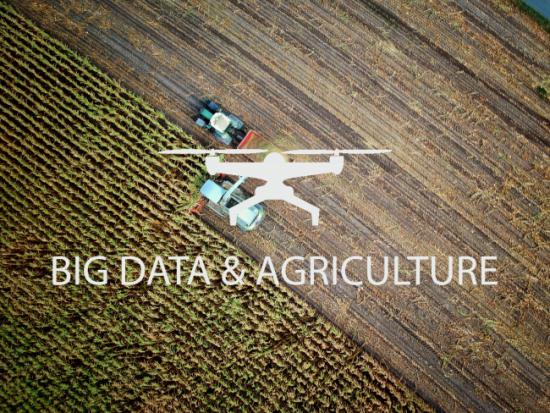
HOW BIG DATA IS REVOLUTIONIZING THE AGRICULTURAL INDUSTRY ?
TOWARDS SMART AGRICULTURE
All over the world, agriculture faces many increasingly complex challenges. These include global issues such as feeding an ever-growing population properly while using fewer and fewer resources, adapting to the effects of global warming, the pressure on water resources or the decrease in available land. Also, for many countries, agriculture must seriously work on its attractiveness, especially for young people by reducing the arduousness of work and offering more free time. While nurse, technician, farmer, manager, today’s farmers have 1,000 jobs and often work alone. Finally, the agricultural world must satisfy the new expectations of consumers, who are increasingly demanding with regard to their food, whether in terms of quality or traceability. These different requirements can be met by the technology and in particular by the Big data .
Every day, 2.5 quintillion bytes of data 2.5 quintillion bytes of data are produced worldwide. The last 5 years have produced as much data as the last 50 years. The global market for Big Data is estimated to be in the tens of billions of dollars per year. The agricultural industry has a lot to do with it. This sector effectively generates a colossal volume of valuable data with the explosion of sensors. Investment in the agricultural big data is constantly increasing. Economists agree that we are witnessing the next agricultural revolution. We’ re even talking about digital agriculture or smart agriculture, i.e. an agriculture that uses information and communication technologies.
In fact, digital agriculture was born 40 years ago with the first soil observation satellites and accelerated in the 1980s with the explosion of computing capacity. The third phase of acceleration took place at the beginning of the 21st century with the emergence of new opportunities such as the smartphone, GPS or new satellites, much more sophisticated, and lately, with connected objects. So, we are now in a very favourable situation for digital agriculture.
THE POWER OF DATA
The potential of big data seems to be incredible and its impact, immense. Faced with the range of opportunities available, the rate of adoption of new technologies within the agricultural sector is steadily increasing, despite the high purchase costs.
From a personal point of view, these technological data tools allow farmers more free time through the optimization of their production. Thanks to this technology, the farmer can intervene in a very precise way on their farm. Until then, subject to the vagaries of the market, the climate and health crises, the farmer will be able to convert all the data from the sensors into incredible control tools. On the other hand, big data is leading us towards precision agriculture, which is greener and more economical. Moreover, Scanners, sensors, analytical tools are also more and more used in food tracking to monitor and collect data on their supply chains. They allow a complete monitoring of the quality of the products, thus meeting the new requirements of the consumers. These technologies also help to reduce waste in the supply chain. Remember that 40% of the food produced in the world is thrown away, including 10% to 15% of finished products. The data are also revolutionizing the traditional process used to create new plant species, which is expensive, labour-intensive, and can take more than 10 years. Big data speeds things up.
At the same time, as in other sectors in full transformation, there is a profusion of startups offering new services and revolutionizing an already well-established model. Many technology startups have entered this market niche to meet a wide range of challenges to improve and transform food and energy production. New firms are being created that specialize in the collection, aggregation and analysis of data. Their objective is to provide farmers with individual plans to be able to use their land in the most efficient way possible according to the desired objectives and various environmental constraints. In 2015, more than 500 agricultural technology startups raised $4.6 billion. On the other hand, the major global players, GAFAs, are involved in this digital transformation by investing several million dollars.
CONCLUSION
The agricultural big data quickly took a considerable place in the daily life of farmers and became indispensable very fast. Anyway, the needs on this market are inexorably growing due to the decrease in the number of farmers and, as a result, the surface areas of the farms are bound to be more and more important. The data promise a quantum leap towards more economical and greener high-precision agriculture, but also a scientific revolution in the understanding of agriculture-environment-climate relationships. The benefits are numerous, more time for the farmer, more precision, more anticipation, more savings and more respect for the environment. Big data pays off. It is still difficult to really put a figure on the contribution of this new digital revolution. We do not know what we will gain by investing in these technologies, and some will probably lose, but in the long term the contribution of knowledge to agriculture will be incredible.
However, there is a real economic issue around the question of who owns the data. If the farmer becomes a «simple» user of the data but does not own it, the entire agricultural economic circuit can be modified. Therefore, some farmers are concerned about data protection, especially when you know that land is sold at 20%in the USA more if it is accompanied




 English
English Français
Français